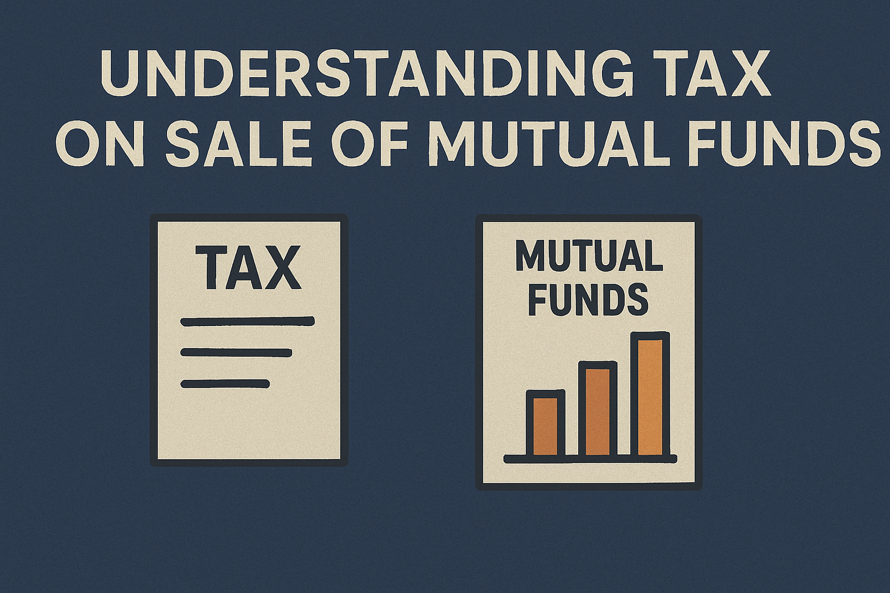Understanding tax on sale of mutual funds: A guide

Many view mutual funds as one of the best ways to invest their money, as they simplify the path to achieving financial goals. One of the most significant advantages of mutual funds is that they are tax-efficient investment vehicles. Therefore, understanding tax on sale of mutual funds can help you execute your investments and pay less in taxes.
Overview of mutual fund taxation
Profits from mutual fund investments are referred to as capital gains. There is taxation on these capital gains. Therefore, you must know how your taxes will work before putting money into mutual funds. In certain circumstances, you may also take advantage of tax deductions.
Basics of mutual funds and tax implications
Mutual fund taxes in India, including tax on sale of mutual fund units, apply to earnings from mutual fund investments. Before investing, learn about mutual fund profit taxes. Besides, mutual fund taxes entail investment commitments.
Key Tax Terms Explained
For sound financial planning, you must understand tax on sale of mutual funds. Key terms for comprehending mutual fund sales tax include:
- Capital gains are the profits you make when you sell your mutual fund units.
- If you own debt mutual funds for less than three years, you will be charged on the short-term capital gain (STCG) based on your tax slab.
Types of mutual funds and their tax treatment
Maximizing your investments and properly handling your returns when redeeming mutual funds depend on your awareness of tax on sale of mutual funds. Outlined below are the specific tax rules that apply to various types of funds:
Equity Funds and Taxation
- Short-term capital gains (STCG): Profits from equity mutual funds held for less than a year are subject to a 15% flat tax rate.
- Long-term capital gains (LTCG): Up to one lakh rupees in gains from equity mutual funds held for more than a year are free from taxation. Moreover, without the advantages of indexation, gains beyond this threshold are subject to 10% taxation.
Debt Funds and Tax Considerations
- Short-term capital gains (STCG): Your taxable income is increased by the gains from debt funds you hold for fewer than 36 months. Further, the tax you must pay on these gains depends on your income bracket.
- Long-term capital gains (LTCG): After receiving indexation advantages, gains from debt funds held for over 36 months are subject to 20% tax. Besides, indexation adjusts the purchase price for inflation, lowering taxable gains and simplifying tax payments.
Hybrid Funds: Understanding the Tax Rules
The amount of equity exposure determines hybrid or balanced fund taxes. Hybrid funds investing over 65% in stocks face taxation similar to equity funds.
Capital gains tax on mutual funds
Investors must pay capital gains tax when they sell mutual fund units and make money. Knowing how to plan their taxes correctly is essential.
• Definition and Importance of Capital Gains Tax
Taxes on capital gains are based on the profit made when selling capital assets, such as mutual funds. The tax on sale of mutual funds is due when an owner sells their fund units for more than they paid. This tax is significant because it brings in government money and ensures that investment income is taxed fairly.
• How Capital Gains are Calculated for Mutual Funds
To determine the tax on sale of mutual funds, determine whether the gain on the mutual funds is short-term or long-term. Then, find the total cost of the purchase, which includes the price paid and any fees. For long-term gains, take inflation into account. Further, to get the realized amount, subtract the sale price from the fees.
• Short-term vs Long-term Capital Gains Tax Rates
India has a 20% tax on stock mutual funds kept for less than a year. This is known as STCG, or short-term capital gains tax. Loan funds can also yield short-term cash returns of 20%. Therefore, if you hold on to stocks or mutual funds in India for over a year, you must pay 12.5% long-term capital gains tax (LTCG). LTCG applies a 12.5% charge on units held for over 36 months in debt funds.
Legal framework governing mutual funds taxation
In India, the Income Tax Act of 1961 sets the rules for taxing mutual funds. It divides funds into equity and non-equity groups and uses various tax rates based on how long the funds have been held. Moreover, structured capital gains clauses, including those related to the tax on sale of mutual funds, are designed to promote long-term investments, ensure rules are followed, and create openness.
Recent Changes in Tax Laws Affecting Mutual Funds
The recent changes in tax laws in India have greatly affected mutual fund investors. Besides, the Union Budget 2024 raised the tax on equity-oriented mutual funds from 10% to 12.5% on long-term capital gains (LTCG) and from 15% to 20% on short-term capital gains (STCG). The LTCG exemption limit was also increased from ₹1 lakh to ₹1.25 lakh.
Impact of Union Budget on Mutual Fund Investments
In India, mutual funds invested 22.45 trillion Indian rupees into equity at the end of the financial year 2023. The Union Budget 2024–2025 included several initiatives that impact investments in mutual funds:
- Elimination of Debt Fund Indexation: If indexation perks for debt mutual funds are taken away, they might not be as appealing to long-term investors who want to save money on taxes.
- Modifications to Dividend Taxation: Now, dividends from mutual funds are taxed based on an individual’s income tax brackets. This means owners in higher tax brackets may have to pay more taxes.
Strategies to minimize tax on mutual funds
Effective strategies to lower the tax on sale of mutual funds enable investors to maximize profits and reduce their total tax outgo.
• Tax Loss Harvesting Explained
Tax harvesting means selling a certain number of Equity Mutual Fund units yearly to earn long-term gains and then returning the money to the same fund. Hence, investors can use this method to keep their long-term returns below the Rs 1 lakh limit.
• Importance of Holding Period in Tax Planning
Investors hold mutual fund units from when they buy them until they sell them. Further, your mutual fund investment rises with compounding as the months and years pass. When you sell your assets or cash in your profits, the length of your holdings matters because holding time affects capital gains taxes.
• Choosing Between Growth and Dividend Options for Tax Efficiency
Investors choose growth or dividends based on financial objectives, risk tolerance, and taxes. Growth is best for long-term wealth generation. If you need a regular income, consider choosing dividends.
Calculation examples for mutual fund taxation
Fund category and duration determine the tax on sale of mutual funds, and this directly affects investors’ profitability. Details regarding tax calculation are necessary for proper financial planning.
Case Study: Calculating Tax on Equity Fund Gains
After 18 months, an investor redeems equity mutual fund units, earning ₹1,50,000. LTCG tax applies because the holding duration exceeds 12 months. The tax rate on LTCG exceeding ₹1 lakh is set at 10% without indexation.
Taxable gain = ₹1,50,000 – ₹1,00,000 = ₹50,000.
Tax = 10% of ₹50,000 = ₹5,000.
Case Study: Tax Calculation for Debt Fund Redemption
After thirty months, an investor redeems debt fund units with ₹2,00,000 earnings. Indexation allows the long-term capital gains tax to be 20%.
After indexation, the taxable gain drops to ₹1,20,000.
Tax = ₹120,000 x 20% = ₹24,000.
Reporting mutual fund taxes
For taxation of mutual funds, dividend income, capital gains on sales, and holding periods must be recorded appropriately. Proper documentation and knowledge of tax law prevent penalties for filing taxes.
How to Report Mutual Fund Gains in ITR
Your Income Tax Return (ITR) categorizes mutual fund gains as short-term or long-term, depending on the holding period. Tax authorities impose a 15% tax on short-term capital gains (STCG) from equity funds, while they tax long-term capital gains (LTCG) exceeding ₹1 lakh at 10%.
In ITR-2 or other forms, report these profits under Schedule CG. Include dividends under income from other sources. Verify information to prevent inconsistencies and fines.
Common Mistakes to Avoid in Tax Filing for Mutual Funds
A typical mistake to avoid in tax files for mutual funds is ignoring the tax on the sale of mutual funds, which comprises capital gains tax, short-term if held less than a year, and long-term if held longer. Many investors misunderstand the holding periods correctly or fail to record these profits.
Tax implications for NRIs investing in Indian mutual funds
Indian mutual funds provide an opportunity for NRIs to diversify their portfolios. Still, awareness of the tax on sale of mutual funds and DTAA benefits is essential for maximizing return and compliance.
• Special Tax Rules for NRI Investors
An NRI can claim a standard 30% deduction on rental income and a deduction for paid municipal taxes. Capital gains tax: Depending on the capital asset and holding duration, NRI capital gains are subject to a 12.5% or 20% slab rate (plus any relevant surcharge and cess).
• Double Taxation Avoidance Agreements (DTAA)
India has signed DTAAs with several countries to help NRIs avoid double taxation. If they live in a country with which India has signed DTAAs and pay taxes there, they can avail of the benefit offered under DTAA.
Conclusion
Investors who worry about taxation lowering mutual fund returns may study how they are taxed. By comparing long—and short-term stock and debt fund tax regulations, they may decide what’s best. Investing in tax-saver funds may help lower the tax on the sale of mutual funds and create long-term wealth.
FAQs
Q. How are mutual funds taxed when sold after a year?
The long-term capital gains (LTCG) tax is 12.50% if you sell after 12 months. However, the LTCG tax only applies to profits beyond Rs 1.25 lakh, providing some relaxation.
Q. What is the difference between indexation and non-indexation in mutual funds?
Indexation in mutual funds modifies investment purchase prices to account for inflation. However, non-indexation calculates capital gains without inflation, which may increase taxable profits.
Q. Can mutual fund losses be carried forward for tax deduction?
According to income tax laws, you can carry forward mutual fund losses for up to eight assessment years to offset future profits, which reduces the tax on the sale of mutual funds.
Q. Are there any mutual funds that offer tax-free returns?
Equity-Linked Savings Schemes (ELSS) profits are tax-free per Section 80C of the Income Tax Act. However, long-term gains beyond ₹1 lakh are subject to taxes, so under present laws, returns are not tax-free.
Q. How does SIP investment affect tax calculation on mutual funds?
Investors receive short-term capital gains when they redeem units of debt mutual funds purchased under SIPs after holding them for less than three years. Such gains contribute to the investor’s overall income and are taxed according to the applicable slab rates.
Q. What is the role of financial advisors in tax optimization?
Financial advisors may help you manage withdrawals and create a tax-efficient investment plan. They also explain the tax consequences of your actions.
Q. How to utilize portfolio management services for tax efficiency?
Portfolio management includes tax planning. Most PMS investors are high-tax HNIs and UHNIs. Moreover, tax preparation is essential for investors to minimize tax bills and maximize investment earnings.
Q. What is the future of mutual fund taxation in India?
India’s tax regulations on mutual funds could be varied in the future. This would impact the tax on the sale of mutual funds and affect investment planning, legal provisions, and portfolio returns.
Q. What are the advanced tax planning techniques for mutual fund investors?
Strategic asset allocation, capital loss harvesting, redemption timing, ELSS deductions, and DTAAs minimize tax expense and enhance mutual fund investors’ returns.
Q. What are the predictions and trends in tax regulations?
Tax trends foresee greater digital compliance, rate fluctuations, strict reporting requirements, and convergence internationally, which will affect investment planning, notably related to mutual funds and capital gains.
Disclaimer
The stocks mentioned in this article are not recommendations. Please conduct your own research and due diligence before investing. Investment in securities market are subject to market risks, read all the related documents carefully before investing. Please read the Risk Disclosure documents carefully before investing in Equity Shares, Derivatives, Mutual fund, and/or other instruments traded on the Stock Exchanges. As investments are subject to market risks and price fluctuation risk, there is no assurance or guarantee that the investment objectives shall be achieved. Lemonn (Formerly known as NU Investors Technologies Pvt. Ltd) do not guarantee any assured returns on any investments. Past performance of securities/instruments is not indicative of their future performance.







